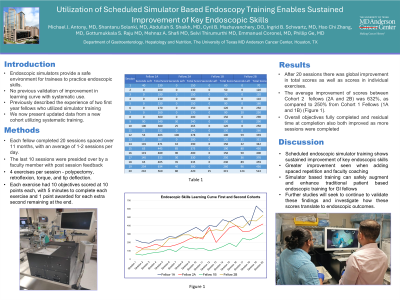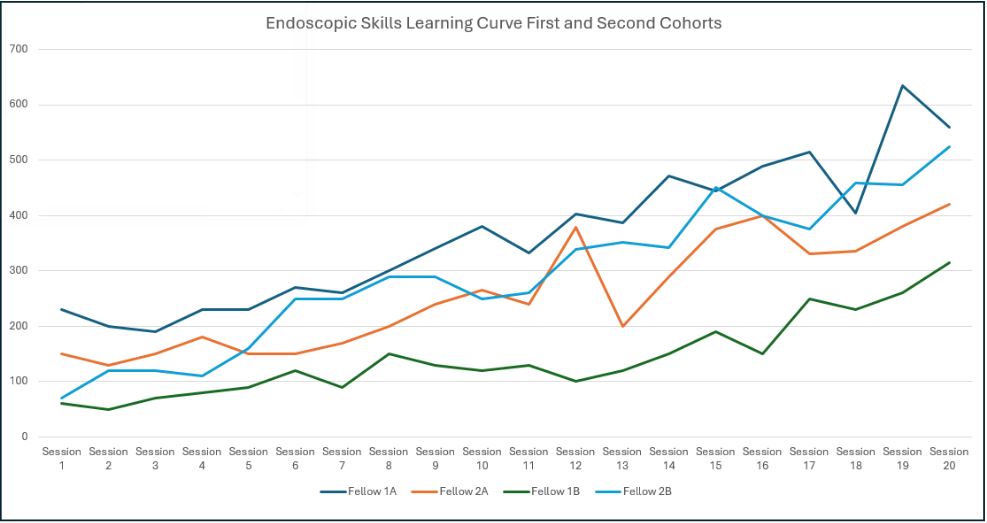Tuesday Poster Session
Category: General Endoscopy
P4089 - Utilization of Scheduled Simulator Based Endoscopy Training Enables Sustained Improvement of Key Endoscopic Skills
Tuesday, October 29, 2024
10:30 AM - 4:00 PM ET
Location: Exhibit Hall E

Has Audio
- MA
Michael J. Antony, MD
University of Texas MD Anderson Cancer Center
Houston, TX
Presenting Author(s)
Michael J. Antony, MD1, Shantanu Solanki, MD, MPH2, Abdullah S. Shaikh, MD1, Cyril B. Mazhuvanchery, DO1, Ingrid B. Schwartz, MD1, Hao Chi Zhang, MD2, Gottumukkala S. Raju, MD1, Mehnaz A. Shafi, MD1, Selvi Thirumurthi, MD, MS, FACG2, Emmanuel Coronel, MD2, Phillip Ge, MD2
1University of Texas MD Anderson Cancer Center, Houston, TX; 2MD Anderson Cancer Center, Houston, TX
Introduction: Endoscopic simulators provide a safe training environment for gastroenterology trainees to improve their technical endoscopic skills. The precise improvement in learning curves while incorporating a scheduled simulator endoscopy curriculum has not been previously validated. We had previously reported on the learning curve of two first year adult gastroenterology fellows (Cohort 1) utilizing the Thompson Endoscopic Skills Trainer (TEST) as part of their first-year training. We now present the data of a new cohort of first year fellows (Cohort 2) who have similarly undergone routine simulator training sessions.
Methods: Building on the previous longitudinal quality improvement project conducted at the ACGME-accredited University of Texas MD Anderson Cancer Center adult gastroenterology fellowship program, the new cohort of first year fellows participated in scheduled TEST endoscopic simulation sessions spaced throughout their first year of training. Each fellow completed 20 sessions spaced over 11 months, with an average of 1-2 sessions per day. The last 10 sessions were presided over by a faculty member who would provide post session feedback.
Each session involved 4 exercises focused on polypectomy, retroflexion, torque control, and tip deflection. Each exercise had 10 objectives scored at 10 points each, with 5 minutes to complete each exercise and 1 point awarded for each extra second remaining at the end.
Results: After 20 sessions the average improvement of scores between Cohort 2 fellows was 632%, as compared to 250% from Cohort 1 Fellows (Figure 1). Overall objectives completed and residual time at completion also both improved as more sessions were completed (Table 1).
Discussion: Utilization of scheduled endoscopic simulator training has shown sustained improvement of key endoscopic skills over a year of gastroenterology fellowship. A greater percentage improvement in score from the first year of data to the second could be attributed to spacing out sessions throughout the year of training, as well as incorporating a faculty member to provide post session feedback. These findings encourage the use of simulator-based training in conjunction with traditional patient-based endoscopy as a means for trainees to develop their skills in a safe and regimented way. Further studies will seek to continue to validate these findings and investigate how these scores translate to endoscopic outcomes.

Note: The table for this abstract can be viewed in the ePoster Gallery section of the ACG 2024 ePoster Site or in The American Journal of Gastroenterology's abstract supplement issue, both of which will be available starting October 27, 2024.
Disclosures:
Michael J. Antony, MD1, Shantanu Solanki, MD, MPH2, Abdullah S. Shaikh, MD1, Cyril B. Mazhuvanchery, DO1, Ingrid B. Schwartz, MD1, Hao Chi Zhang, MD2, Gottumukkala S. Raju, MD1, Mehnaz A. Shafi, MD1, Selvi Thirumurthi, MD, MS, FACG2, Emmanuel Coronel, MD2, Phillip Ge, MD2. P4089 - Utilization of Scheduled Simulator Based Endoscopy Training Enables Sustained Improvement of Key Endoscopic Skills, ACG 2024 Annual Scientific Meeting Abstracts. Philadelphia, PA: American College of Gastroenterology.
1University of Texas MD Anderson Cancer Center, Houston, TX; 2MD Anderson Cancer Center, Houston, TX
Introduction: Endoscopic simulators provide a safe training environment for gastroenterology trainees to improve their technical endoscopic skills. The precise improvement in learning curves while incorporating a scheduled simulator endoscopy curriculum has not been previously validated. We had previously reported on the learning curve of two first year adult gastroenterology fellows (Cohort 1) utilizing the Thompson Endoscopic Skills Trainer (TEST) as part of their first-year training. We now present the data of a new cohort of first year fellows (Cohort 2) who have similarly undergone routine simulator training sessions.
Methods: Building on the previous longitudinal quality improvement project conducted at the ACGME-accredited University of Texas MD Anderson Cancer Center adult gastroenterology fellowship program, the new cohort of first year fellows participated in scheduled TEST endoscopic simulation sessions spaced throughout their first year of training. Each fellow completed 20 sessions spaced over 11 months, with an average of 1-2 sessions per day. The last 10 sessions were presided over by a faculty member who would provide post session feedback.
Each session involved 4 exercises focused on polypectomy, retroflexion, torque control, and tip deflection. Each exercise had 10 objectives scored at 10 points each, with 5 minutes to complete each exercise and 1 point awarded for each extra second remaining at the end.
Results: After 20 sessions the average improvement of scores between Cohort 2 fellows was 632%, as compared to 250% from Cohort 1 Fellows (Figure 1). Overall objectives completed and residual time at completion also both improved as more sessions were completed (Table 1).
Discussion: Utilization of scheduled endoscopic simulator training has shown sustained improvement of key endoscopic skills over a year of gastroenterology fellowship. A greater percentage improvement in score from the first year of data to the second could be attributed to spacing out sessions throughout the year of training, as well as incorporating a faculty member to provide post session feedback. These findings encourage the use of simulator-based training in conjunction with traditional patient-based endoscopy as a means for trainees to develop their skills in a safe and regimented way. Further studies will seek to continue to validate these findings and investigate how these scores translate to endoscopic outcomes.

Figure: Figure 1. Endoscopic Skills Learning Curve of First and Second Cohorts
Note: The table for this abstract can be viewed in the ePoster Gallery section of the ACG 2024 ePoster Site or in The American Journal of Gastroenterology's abstract supplement issue, both of which will be available starting October 27, 2024.
Disclosures:
Michael Antony indicated no relevant financial relationships.
Shantanu Solanki indicated no relevant financial relationships.
Abdullah Shaikh indicated no relevant financial relationships.
Cyril Mazhuvanchery indicated no relevant financial relationships.
Ingrid Schwartz indicated no relevant financial relationships.
Hao Chi Zhang indicated no relevant financial relationships.
Gottumukkala Raju indicated no relevant financial relationships.
Mehnaz Shafi indicated no relevant financial relationships.
Selvi Thirumurthi indicated no relevant financial relationships.
Emmanuel Coronel indicated no relevant financial relationships.
Phillip Ge: Alira Health – Consultant. Boston Scientific – Consultant. Fujifilm Medical Systems – Consultant. Neptune Medical – Consultant. Olympus America – Consultant. Ovesco Endoscopy USA – Consultant.
Michael J. Antony, MD1, Shantanu Solanki, MD, MPH2, Abdullah S. Shaikh, MD1, Cyril B. Mazhuvanchery, DO1, Ingrid B. Schwartz, MD1, Hao Chi Zhang, MD2, Gottumukkala S. Raju, MD1, Mehnaz A. Shafi, MD1, Selvi Thirumurthi, MD, MS, FACG2, Emmanuel Coronel, MD2, Phillip Ge, MD2. P4089 - Utilization of Scheduled Simulator Based Endoscopy Training Enables Sustained Improvement of Key Endoscopic Skills, ACG 2024 Annual Scientific Meeting Abstracts. Philadelphia, PA: American College of Gastroenterology.
